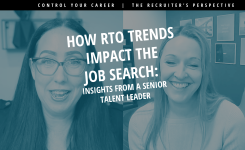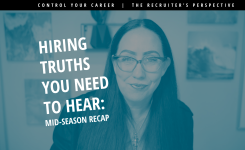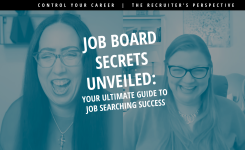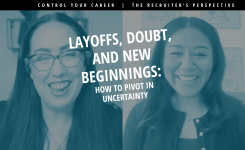Season 11: The Recruiter's Perspective 2025
Hiring for Skills, Not Degrees: The Good, the Bad, and the Reality Check
Podcast Audio Only:
The Rise of Skills-Based Hiring and What It Means for Your Career
There’s a growing shift in hiring and it’s not just about AI, remote work, or flexible hours. It’s about rethinking what qualifies someone for a role. In today’s job market, many employers are no longer prioritizing where you went to school or whether you hold a certain title. Instead, they’re asking a simpler, more practical question: Can you do the job?
In this episode of Control Your Career, Julia talks with Katie Rakusin, Senior Director of Talent Acquisition at Merit America, about how her organization is actively practicing competency-based hiring. They discuss what this shift looks like on the inside and how professionals can adapt their job search strategies to match.
What Is Competency-Based Hiring?
Competency-based hiring, also known as skills-based hiring, is about identifying specific skills, behaviors, and values that predict success in a role. It’s less about what’s on paper and more about what you can actually do. For Merit America, that means using structured interviews, performance-based assessments, and clearly defined hiring criteria to evaluate candidates without bias and without relying on assumptions.
Katie breaks down how they develop competency frameworks, how hiring teams are trained to use them, and how candidates are informed of what’s being evaluated throughout the process. It’s a method that promotes equity, transparency, and better hiring decisions overall.
Why Degree Requirements Are Losing Power
One of the most powerful insights from the conversation is that Merit America doesn’t require a college degree for most roles. It’s part of their commitment to expanding access to meaningful work. Instead, they ask candidates to reflect on their transferable skills and provide space in the application process to share how their experience aligns with the role.
This approach opens doors for people with nontraditional backgrounds, career changers, and professionals who may have deep experience but lack formal credentials. It’s a reminder that hiring is moving away from pedigree and toward potential.
A Recruiter’s Take on Resumes, Interviews, and the ATS
Katie offers valuable behind-the-scenes context on how hiring really works. She confirms that no AI is used to screen out applicants at Merit America. Their applicant tracking system (Greenhouse) is used for workflow and organization.
She also shares practical resume tips, including how to structure bullet points for impact, how to tailor your resume for different role types, and why saving your resume as a PDF with your name in the filename actually matters. Interview tips include using AI tools like ChatGPT strategically for prep, but not for writing your entire application.
The Role of Application Questions and Why They’re Not Optional
Instead of requiring cover letters, Merit America uses customized application questions. These aren’t just screening tools, they’re often the first thing read in the review process. Katie explains how a strong response can be more impactful than a perfectly formatted resume. It’s an opportunity for candidates to show genuine interest, explain transferable skills, and demonstrate alignment with the organization’s mission.
Job seekers often overlook these sections or treat them as optional. In a competency-based process, they’re essential.
Creating Equity Through Transparency
One of the most interesting parts of the conversation is how transparent Merit America is with candidates. Applicants are told in advance what competencies are being assessed and who will be conducting each interview. This allows candidates to prepare more effectively and reduces the guesswork that often makes hiring processes feel inaccessible or unfair.
Katie emphasizes that this model doesn’t just help hiring teams, it helps job seekers better understand their own strengths and readiness. It’s also valuable for onboarding, as hiring managers already have a sense of what support or development a new hire might need.
AI in the Job Search: Helpful Tool or Hidden Risk?
The episode also explores how AI is affecting both job seekers and recruiters. While AI can help candidates brainstorm responses, identify keywords, and generate interview questions, Katie cautions against over-reliance. Generic, AI-written answers are easy to spot and often lack the authenticity that recruiters are hoping to see.
She also touches on the risks of using automated tools to submit applications, especially when a small error, like selecting the wrong dropdown, can disqualify you without you ever knowing it. Her advice: be thoughtful, double-check your application, and use AI as an enhancement, not a replacement for your voice.
Final Thoughts: What Recruiters Want Job Seekers to Know
Toward the end of the episode, Katie offers a powerful reminder: recruiters are rooting for you. They want the next person they interview to be the right fit. But that doesn’t mean the process is easy for either side.
Her parting advice to job seekers? Pay attention to details, take application questions seriously, and stay human in how you present yourself. That’s what stands out in a competency-based process and it’s what helps you take real control of your career.
Connect with Katie on LinkedIn: https://www.linkedin.com/in/katierakusin/
Career Advancement Intensive
A Transformative VIP Experience to
Propel Your Career Forward






